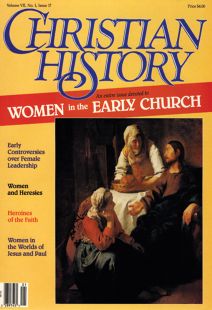The Problem with Special Women’s Issues
IN A BRAVE EFFORT to do what all the king’s horses and all the king’s men couldn’t do, this magazine is attempting to re-assemble and present an accurate account of women’s participation in the history of the church.
But are special issues the way to do that? Is there not perhaps some better way to give women the real place they’ve had in history, noticing the noteworthy ones, including the experiences of women as part of the whole fabric of historical reporting?
To the interested observer, particularly to women who are aware of the “normal” way history is done (by ignoring women), giving women their due is long overdue. It seems a great idea to right the wrongs that for so long have excluded females from the pages not only of history, but of most nonfiction for the general reader. Women wonder what the problem is. Can’t we just do it right from now on?
But to the person who attempts to start “doing it right,” it’s not so easy. How do you locate information about women in history? Because so many of our source materials were written by men, preserved by men, interpreted and reported on by men, women have been sifted out at every level. Few remain in the narratives, and many are genuinely lost to the written record. We know, because we have clues, that women were influencing, participating in, and being uniquely and specifically affected by certain events and situations. But we do not have enough material, most of the time, to write a rich account, to do them justice, to draw conclusions we can support.
If we attempt to redress the inequity by over-emphasizing the participation and influence of a few women here and there, we perhaps overload the importance of those particular women and skew the account. So, in a very real sense, we need a new kind of specialist, a historical detective whose specialty is searching out women (and other forgotten ones) and assessing their participation, influence, and experience in the light of all the data available, both information specifically about them and other information that may relate to them.
There are dangers in any method we may choose in our attempt to balance the longstanding practice of lopsided reporting. If we produce special issues, we set women apart again, plucking them out of the rest of humanity to put them in the spotlight briefly. We wouldn’t have special issues on men’s participation in history; everyone knows men participated in history. Well, everyone knows women did, too—they just never have talked about it much. So now we’re talking about it.
However, singling women out in this way contributes to the very problem women have been fighting against, the presentation of us as “other,” creatures not quite the same as men. It feeds a mentality we have fought so long, that reaches all the way back to Aristotle and his thinking that women are inferior humans by nature-a belief so persistent that it still influences public and private practices that unnecessarily limit women.
We don’t want to be “the other.” We want to be what we are: fully human. But we would also like justice. And justice seems to be best served with solutions that are at least attempting to redress the omissions and exclusions of centuries.
We accept the special issues gratefully and appreciatively—yet warily, because what we really want is to be there in the regular issues. We would like women to be reported on equally with men, not a 50–50 quota, but true to the real world—the world in which we all live and in which our forebears lived too.
By Patricia Gundry
[Christian History originally published this article in Christian History Issue #17 in 1988]
Patricia Gundry, a free-lance writer from Grand Rapids, Mich., is the author of Neither Slave Nor Free: Helping Women Answer the Call to Church Leadership (Harper & Row, 1987).Next articles
From the Archives: The Acts of Thecla
Fictional Thecla was revered through much of church history.
the EditorsFrom the Archives: The Value of Virginity
Excerpt from an early church document elevates virginity.
the EditorsFrom the Archives: Agnes: the Virgin Martyr
From the bitter persecution of Diocletian (303–305), a young heroine emerged.
PrudentiusEarly Church Women and Heresy
Of course not only women were attracted to the heretical sects that diverged from early church orthodoxy, but women were prominent in their leadership and teachings. Why might this have been?
Ruth A. Tucker and Walter LiefeldSupport us
Christian History Institute (CHI) is a non-profit Pennsylvania corporation founded in 1982. Your donations support the continuation of this ministry
Donate



